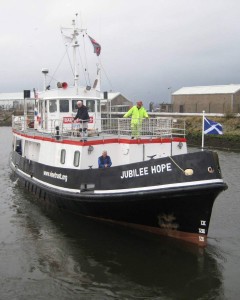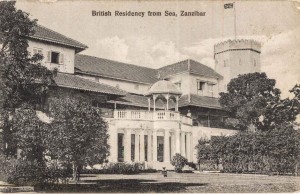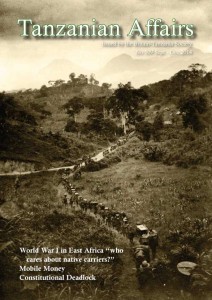Edited by John Cooper-Poole
John Cooper-Poole, who has run the TA reviews section since 2002, covering 38 issues, has decided it is time to hand over the role to someone new. The TA editorial team wishes to express its gratitude to John, who – as we’re sure you will agree – has done a wonderful job.
This means we are now in need of a volunteer to take on the role of reviews editor. Please contact David Brewin or Ben Taylor if you are interested.
UJAMAA – The hidden story of Tanzania’s economic development from the grassroots Ralph Ibbott, Crossroads Books £15.99 In the 1960s the Ruvuma Development Association (RDA) was formed by new villages that were being run as genuine cooperatives. The villagers grew their crops by collective work and the villages were run democratically through open meetings and elected officials who had no payment.
Development in the RDA villages was slow but real, with improvements in food supply, health and education and most significantly in the confidence of the villagers as they learned to manage their affairs. The villages exemplified the policies that Julius Nyerere was expounding in his ‘Socialism and Rural Development’ and he gave the RDA his personal support.
RDA villages were probably the most successful of the various forms of collective farming being attempted across the country and the RDA attracted support from international aid agencies.
Although collective villages and cooperative farming were party and government policies, in 1969 the TANU National Executive decreed that RDA be dissolved. Why? Andrew Coulson gives an explanation in his ‘Tanzania, A Political Economy’: TANU regional and national politicians became fearful that their position and power would be undermined if independent, politicised villages became the norm. Ibbott provides detailed experience to support this conclusion. In addition he has evidence that at least one minister and member of TANU National Executive was not just opposed to the RDA but also to Ujamaa, which was supposedly party and government policy.
Ibbott was an advisor to RDA and lived in Litowa, the first RDA village. He was closely involved with the work and life of the villages until the dissolution of RDA and on his return to Britain was invited by the Commonwealth Secretariat to write a report of his experience with RDA which they intended to publish. However, his report was never published, perhaps because the Commonwealth Secretariat did not want to offend the government of a member state or possibly it was the victim of a change in personnel. The report has been available to academic researchers, and now becomes accessible to a wider readership.
Ujamaa is Ibbott’s record of events, reports by visitors to RDA villages, sections on specific topics and Ibbott’s letter to Nyerere after the dissolution decision (to which there was no reply). He has added a recently written Epilogue which brings together later research on the subsequent history of the ex-RDA villages.
The original report “The Origin, Growth & Disbanding of the RDA” has severe criticism of successive Ruvuma Regional Commissioners. They did not understand the philosophy on which the villages were based and became opposed to something that they could not control.
The last of the sections on specific themes is a profound critique of Nyerere’s failure to turn his political ideas into practical policies. He passed implementation over to party and government officials who had no understanding or experience of promoting voluntary small- scale collective villages. They wanted quick results from large state-organised schemes and were all too ready to fall back on compulsion. Nyerere must have known this.
This is a report prepared to inform and guide those involved with rural development and is probably a unique source for researchers and historians. The general reader who is not familiar with the background might struggle with, for example, the references to Peramiho, the Catholic mission complex near Songea.
Ujamaa makes uncomfortable reading for those of us who uncritically and enthusiastically championed Tanzania through the 70s and 80s. It also has a harsh message for those who are “not interested in politics, I just want to help” – effective development is always political.
John Arnold
(John Arnold, was Regional Secretary, Ruvuma Region, 1963-4.)
NYERERE – The Early Years, Thomas Molony, James Currey 2014. ISBN 9781847010902 £25.00
This book from the pen of the Lecturer in African Studies at the University of Edinburgh aims to present “the first truly rounded portrait of Nyerere’s early life”. There has been little opportunity to learn accurately about the development of Mwalimu’s early thinking and this is a valiant effort to fill the gap.
Even here descriptions of the background to his early upbringing rely on much anecdotal evidence. The need to include even the smallest detail, in an effort to lend more substance to the narration, can give the early pages the air of a doctoral thesis.
This improves in value as the narrative progresses, so that the inferences which are dependent on other studies of the social mores are increasingly replaced by facts more relevant to Nyerere’s particular circumstances. Nevertheless there are many statements asserting that much more evidence about incidents cited must exist somewhere.
The key question that is always asked about great men from humble and at first sight unpromising origins is “Who first realised that this exceedingly bright, above-average young person was not after all destined to blush unseen?” With hindsight we might say that Nyerere would probably have fought his way out anyway, but this book reveals how he caught the eyes of the White Fathers, with their paramount influence and encouragement, and followed this when in relatively privileged positions in Kampala and in London.
The final chapter of this book, titled “Legacy and Reappraisal” is lucid and authoritative. After several pages which may appear “sparsely informed and predominantly uncritical”, the author can rightly claim that this is a valuable piece of research which clearly amplifies the little that was previously published about Nyerere’s early progress. Ending as Nyerere moved away from teaching to active politics, it lays the basis of our understanding of what he came to regard as significant for his country: education, agriculture – and independence.
Geoffrey Stokell
(Geoffrey Stokell first went out to the Gold Coast (now Ghana) in 1953, serving there for thirteen years as an “old-style” merchant trader. After qualifying as an accountant and building an internationally-successful career, in 1983 he went to Tanzania as a missionary with the Moravian Church and was later head of finance for the Tanganyika Christian Refugee Service. He became Treasurer of the Tanzania B-T S Chapter and on his return to the UK in 1996 and was TDT Treasurer.)
HADZABE: By the Light of a Million Fires, Daudi Peterson, with Richard Baalow and Jon Cox. Mkuki na Nyota, Dar es Salaam, 2013. ISBN 978-998708-212-4, 230 pp paperback (with music CD). Tsh50,000
It is difficult not to be fascinated by the Hadza, speakers of a unique click language and one of the last remaining groups of hunter-gatherers in Tanzania. It is easy to sympathise with their struggle to retain control over their customary lands in the Lake Eyasi basin, near Ngorongoro. By the same token, it is not hard to like this handsome volume, which is much more than a coffee table book with excellent photos; it strives to give the Hadza a voice and support their right to choose their own future. The window it opens onto the world of the Hadza is enough to make you envy the ethno-tourists and researchers who visit Hadzaland , if not the hapless folk who have to entertain them.
Hadzabe: By the Light of a Million Fires was compiled by Daudi Peterson with the help of a number of Hadza and Hadzaphiles, including the venerable anthropologist James Woodburn. A limited hardback edition has been sold to raise money for the Dorobo Fund and Ujamaa Community Resource Trust, established by the Peterson family’s eco-tourist enterprise. The paperback and accompanying CD of Hadza music that have now gone on sale are very good value. They are not without their flaws: a tendency to romanticise the Hadza and to demonise their neighbours and an uneven mixture of topics and styles, including a Swahili paean to Nyerere and villagisation on the CD. But I would much rather possess this engaging book and its vibrant music than not.
Martin Walsh
(Martin Walsh is Oxfam GB’s Global Research Adviser. His seminar presentation to the Britain-Tanzania Society on ‘Tanzania’s (agro)pastoral headache’ is available online at http://www.btsociety.org/app/images/events2013/agropastoralist_headache.pdf)
VIOLENT INTERMEDIARIES – African Soldiers Conquest and Everyday Colonialism in German East Africa, by Michelle R Moyd, Ohio University Press, 2014; ISBN 978 08214 2089 8, 328 pp, softback.
The author of this exhaustive and authoritative account of the German colonial years in East Africa was indeed an acknowledged expert on the period even before this book was published. Now the reader has the full story of those years from 1891 to 1918, with the emphasis on the locally-recruited askari, who fought for the Germans almost as if they were of them.
The askari take centre stage throughout the book, indeed from the cover onwards, with an askari, rifle on shoulder, about to take his leave from his family to return to the Schutztruppe, the German colonial army. Chapters show how and where the askari were recruited; the military training and “socialization”; the wars fought by the askari (such as the Maji Maji conflicts of 1905-7); life on the stations within the country; and the inadvertent role of the askari in German colonialism. We learn, among myriads of facts, how many Sudanese initially became askari but how eventually all tribes became merged within the askari hierarchy; how the “legal” wives of askari detained for transgressions were given an allowance for their “household stability”; and how the scorched-earth policy adopted by the Schutztruppe during Maji Maji rebellion disrupted crop cycles and led to labour movement away from the Southern Highlands.
The author takes us through the 1914/18 War from the first campaign to the final 1,200 askari who surrendered to the British in November 1918, effectively closing a definitive chapter in the history of German East Africa and signaling the end of the Schutztruppe.
Although the book is, relatively speaking, hot on the heels of Anderson (2004), Paice (2007) and Samson (2013), it provides not only a great read but a quite different slant on the history of the period. The three maps – produced by Brian E Balsley, an American cartographer – are very illustrative and useful. An extremely full bibliography is of considerable fascination in itself. The index runs to a mere six pages, this being more an observation than a criticism. This work is a marvelous example of how long-term research can come to fruition in a superlative way.
David Kelly
(David Kelly has been involved with East Africa since he wrote the first history of cricket in the region in the 1960s. He is now a book dealer, with Africa a speciality subject; still researches cricket; and is a director of a Dar-based company in the beverage sector.)
TRANSITIONS OF A LIFE, printed and published for private circulation by J K Chande KBE
I first met Sir Andy Chande in the late 1980s, since when, though we now meet less frequently than before, he has become a close personal friend. Transitions is his own collection of speeches on an immense range of topics, all reflecting the dedication he continues to bring, even in retirement, to the management, in its widest sense, of enterprises and organisations with which he has been connected.
The volume is self-published, and to that extent it could probably be classified as a vanity publication; but it deserves none of the sneers which that title often evokes. It naturally lacks the fascination and raciness of his autobiography A Knight in Africa, but it underlines the way the author has been able during his lifetime, modestly but effectively, to participate in and influence some significant social decision-making. Sir Andy has been appointed to at least 100 public positions; his support for the Britain-Tanzania Society has been exemplary; and it comes as no surprise that the most significant chapters reflect his summons to all to dedicate themselves to community service. This is a celebratory volume exemplifying the practical application of two battle-cries of great public principle: Rotary’s “Service above Self” and Freemasonry’s “Love, Charity and Truth”.
TANZANIA; Strength in Unity, Strength in Diversity, published to mark the 50th Anniversary of the United Republic of Tanzania by FIRST Magazine 2014. www.firstmagazine.com, 56 pages.
This is a glossy publication which the publisher tells me “was promoted by the Tanzanian Government and High Commission in London but financed by FIRST via advertising sponsorship. It is being distributed by the High Commission/Foreign Ministry and agencies such as the Tanzania Tourist Board. It is intended for presentation to VIP guests, distribution at investment fora/conferences etc. It will also be printed in FIRST magazine which is made available, on a complimentary basis, to first class passengers on British Airways and other airlines”. I quote this at length to explain why, unless you fall into one of these rarefied categories, you are unlikely to see a copy. Which is a pity.
There are articles by many different people, ranging from President Kikwete to the manager of the Kilimanjaro Hotel in Dar es Salaam – who incidentally is still an expatriate 40 odd years after the hotel was built. (Not the same person!). Some contributors rely heavily on unexplained TLA’s*. None the less, a proud story can be extracted, which is perhaps best summed up by John Malecela when he says “During the 50 years of existence, Tanzania has been a centre for peace and liberation in Africa. All in all, the role played by Tanzania in international and African affairs has been commendable beyond imagination”. Malecela’s piece is perhaps the best of the lot, as one might expect from someone who was at or near the centre of affairs for most of the relevant period.
Professor Mwesiga Baregu writes a thought-provoking piece about the challenges to be faced in working out a new constitution. Another is the last in the booklet, by Walter Bgoya and appropriately titled “The Last Word”. He warns of the dangers currently facing publishing in Tanzania, particularly of school text books; he fears a possible return to the state monopoly arrangements of the 1960s to 1980s, when in rural areas there could be one text book for every 15-20 pupils, and even in urban areas there might be one book for three pupils.
Our own David Brewin has a useful feature about the army mutiny and the Zanzibar revolution of 1964, the “two shocking events which triggered unity”. Incidentally it is a pity that throughout the publication the Britain-Tanzania Society does not get a mention.
*three lettered acronyms, in case you wondered.
J.C-P




